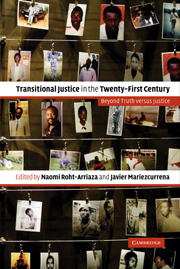Book contents
- Frontmatter
- Contents
- List of contributors
- Acknowledgments
- The new landscape of transitional justice
- Part I Truth, justice, and multiple institutions
- Introduction to Part I
- 1 The Sierra Leone Truth and Reconciliation Commission
- 2 Transitional criminal justice in Sierra Leone
- 3 The Peruvian Truth and Reconciliation Commission and the challenge of impunity
- 4 The “Mexican solution” to transitional justice
- 5 No justice, no peace: Discussion of a legal framework regarding the demobilization of non-state armed groups in Colombia
- 6 Hybrid attempts at accountability for serious crimes in Timor Leste
- Part II Levels of justice: Local, national and international
- Index
3 - The Peruvian Truth and Reconciliation Commission and the challenge of impunity
Published online by Cambridge University Press: 05 June 2012
- Frontmatter
- Contents
- List of contributors
- Acknowledgments
- The new landscape of transitional justice
- Part I Truth, justice, and multiple institutions
- Introduction to Part I
- 1 The Sierra Leone Truth and Reconciliation Commission
- 2 Transitional criminal justice in Sierra Leone
- 3 The Peruvian Truth and Reconciliation Commission and the challenge of impunity
- 4 The “Mexican solution” to transitional justice
- 5 No justice, no peace: Discussion of a legal framework regarding the demobilization of non-state armed groups in Colombia
- 6 Hybrid attempts at accountability for serious crimes in Timor Leste
- Part II Levels of justice: Local, national and international
- Index
Summary
Introduction
The Peruvian Truth and Reconciliation Commission (Comisión de la Verdad y Reconciliación – CVR), which released its Final Report in August 2003, has laid a strong claim to be remembered as one of the most notable among similar experiences of accountability and historical clarification. The CVR produced a large final report as complex and ambitious as those issued by previous commissions, including those of South Africa and Guatemala. With a budget above 13 million dollars, and a staff of over 500 professionals who processed the testimonies of almost 17,000 victims, the magnitude of the CVR operations was second only to the South African Truth and Reconciliation Commission (TRC).
Like the South African TRC, the CVR steered an eminently public process. Not only did it organize public hearings where the victims of violence had an opportunity to share their experiences with the population, but it also conducted a highly visible set of activities aimed at winning public support for the prosecution of those persons who allegedly perpetrated the worst crimes under the Commission's mandate.
The CVR raised expectations on a wide range of issues, including: the clarification of the whereabouts of the disappeared, whose number was established at over 8,500; the exhumation of clandestine burial sites, of which over 4,600 were identified; comprehensive reparations to individual victims; and the prosecution of perpetrators, many of whom were named in the Final Report.
- Type
- Chapter
- Information
- Transitional Justice in the Twenty-First CenturyBeyond Truth versus Justice, pp. 70 - 93Publisher: Cambridge University PressPrint publication year: 2006
- 6
- Cited by



